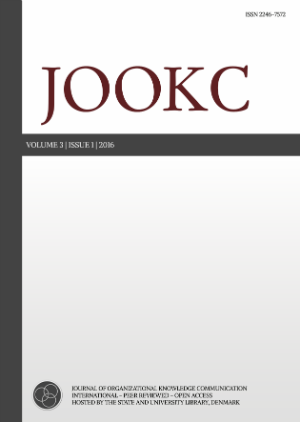Research Design – Composition, Configuration and Interdependencies
DOI:
https://doi.org/10.7146/jookc.v3i1.25219Keywords:
Research design, research question, philosophy of science, methodology, method, data, interdependenciesAbstract
In this essay I will present an integrative view on research design. I will introduce what I
take to be the skeleton components of any research design within the social sciences, i.e.
the elements of research question, philosophy of science, methodology, method and data.
With this as my point of departure I will go on to focus on a presentation, a discussion
and an evaluation of a new appreciation of the interdependencies of the elements in the
research design. An appreciation that favors a relational rather than an atomistic outlook
and which gives rise to an ecological conceptualization of research design. A research design,
in other words, which promotes plasticity and fluidity over adherence to static protocol.
And which, at the same time, does not relinquish control over project-relevant, multifaceted
decision-making processes – and their respective interdependencies – but which deliberates
each and every one of them. The aim of the paper is twofold. At a more abstract level, it
aims at paving the way for establishing a reflexive approach to research design which, in turn,
would be in tune with the tenets of the field of Organizational Knowledge Communication
(e.g. Kastberg, 2014). At a more concrete level, it aims at presenting an idea of research
design which would – hopefully – be an inspiration to (young) scholars.
References
xxx
Downloads
Published
How to Cite
Issue
Section
License
§1. Object of the agreement and rights
The author guarantees that she/he has the copyright to the work and that this specific publishing does not offend other persons’, organizations’ or companies’ copyright.
- 1.1. The author gives the Journal of Organizational Knowledge Communication a non-exclusive right to publish the work in the electronic version of the non-commercial journal The Journal of Organizational Knowledge Communication. This journal is an open access journal and will be available for free on the internet and as thus available for all internet users worldwide. The work will be published in English.
- 1.2. The journal is published under a Creative Commons license Attribution Non-commercial No derivatives (cc by-nc-sa) http://creativecommons.org/about/license/. This license allows others to download your work and share it with others as long as they mention you and link back to you, but they can’t change it in any way or use it commercially.
- 1.3. The author is the copyright holder and the author agrees to the above mentioned Creative Commons license.
- 1.4. The Journal of Organizational Knowledge Communication is not entitled to transfer the obtained right in this agreement to a third party.
§2. Publishing on the Internet
The Journal of Organizational Knowledge Communication is under an obligation to publish the work within a reasonable time span and within the first year after the manuscript has been accepted for publication. The Journal of Organizational Knowledge Communication is entitled to use the work or parts of the work for marketing purposes.
§3. Proofreading
The Journal of Organizational Knowledge Communication is edited, peer reviewed and proofread by the editors and the international peer review board in collaboration with the author.
§4. Availability on the Internet
The article will be published on the Internet at www.jookc.com.





